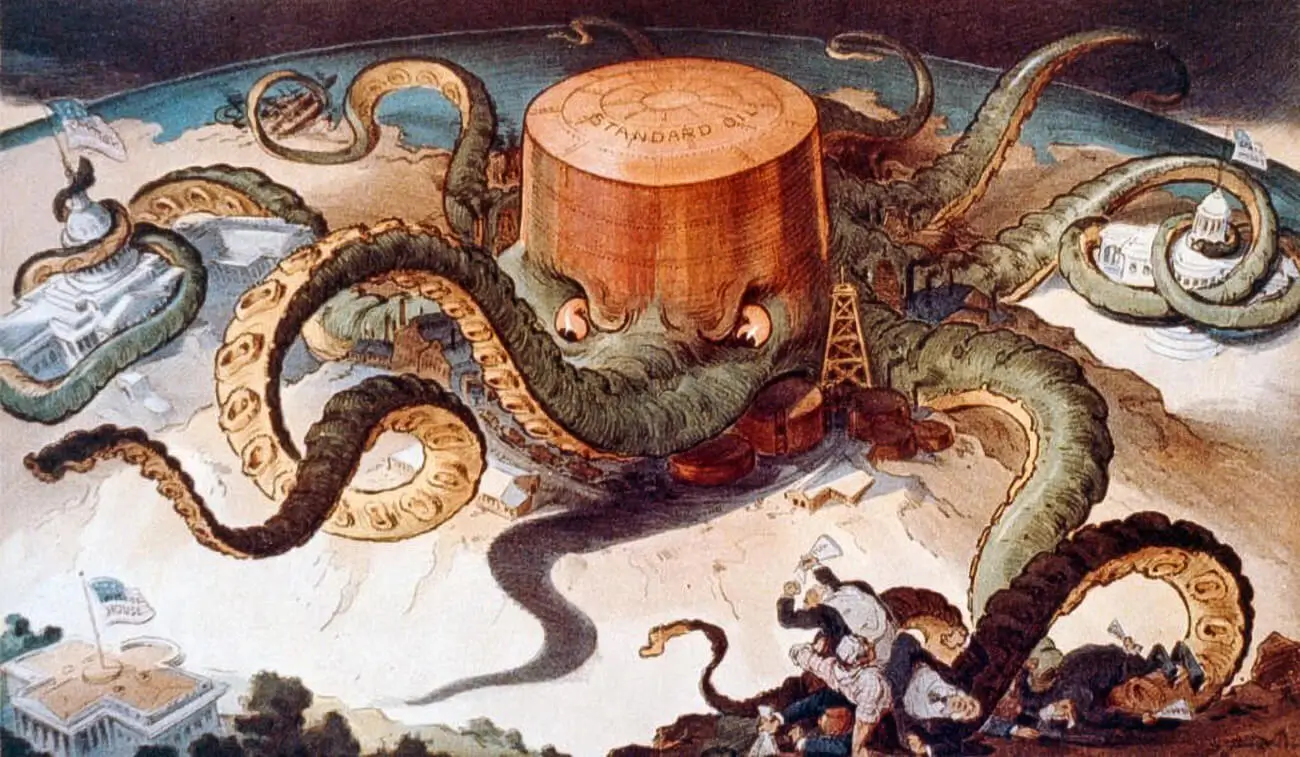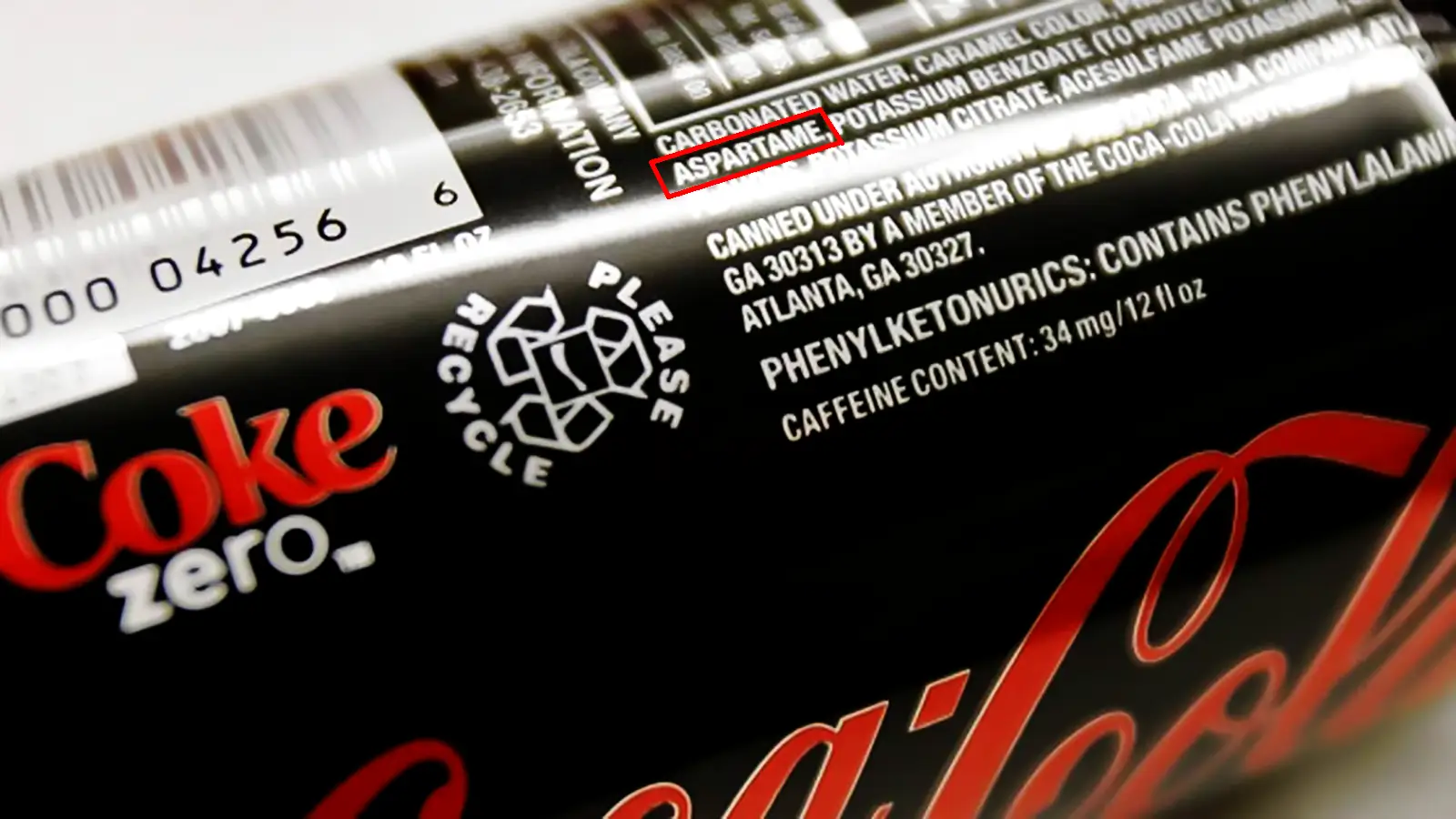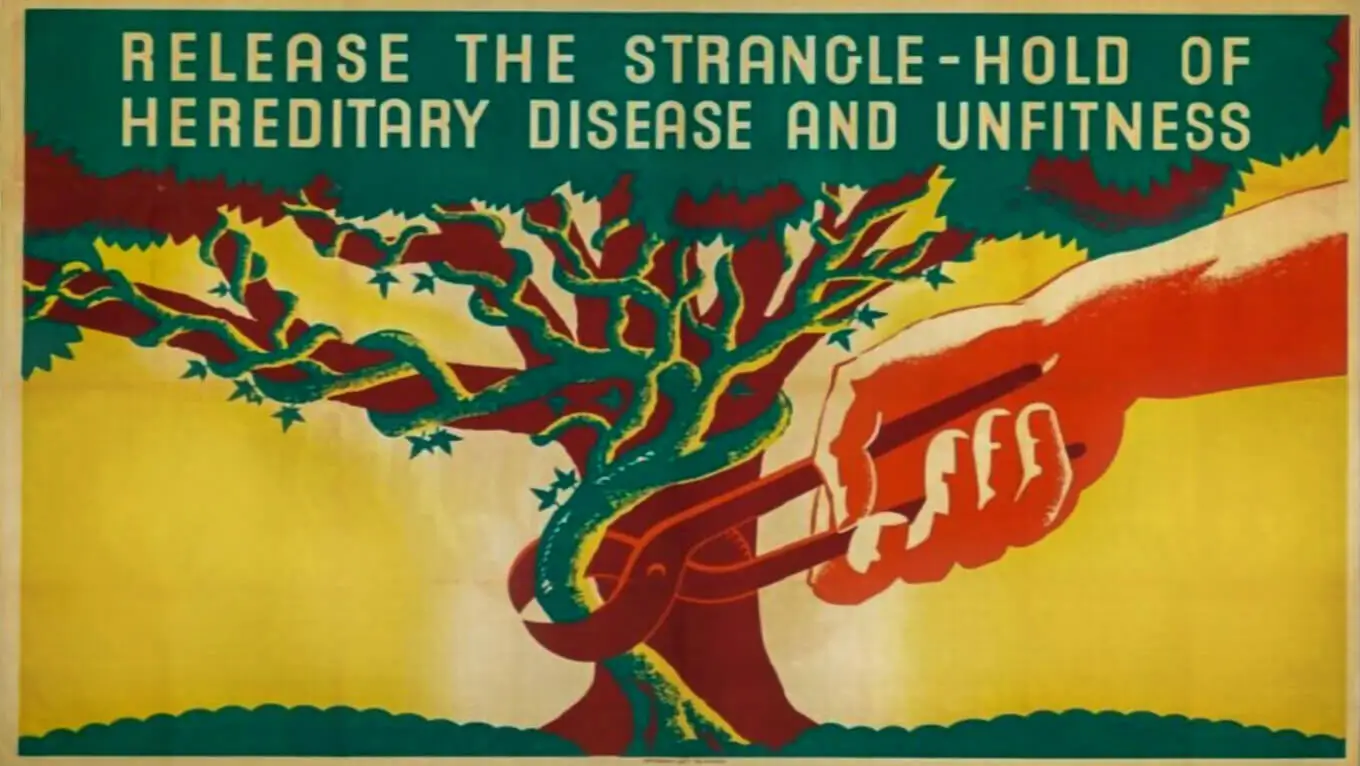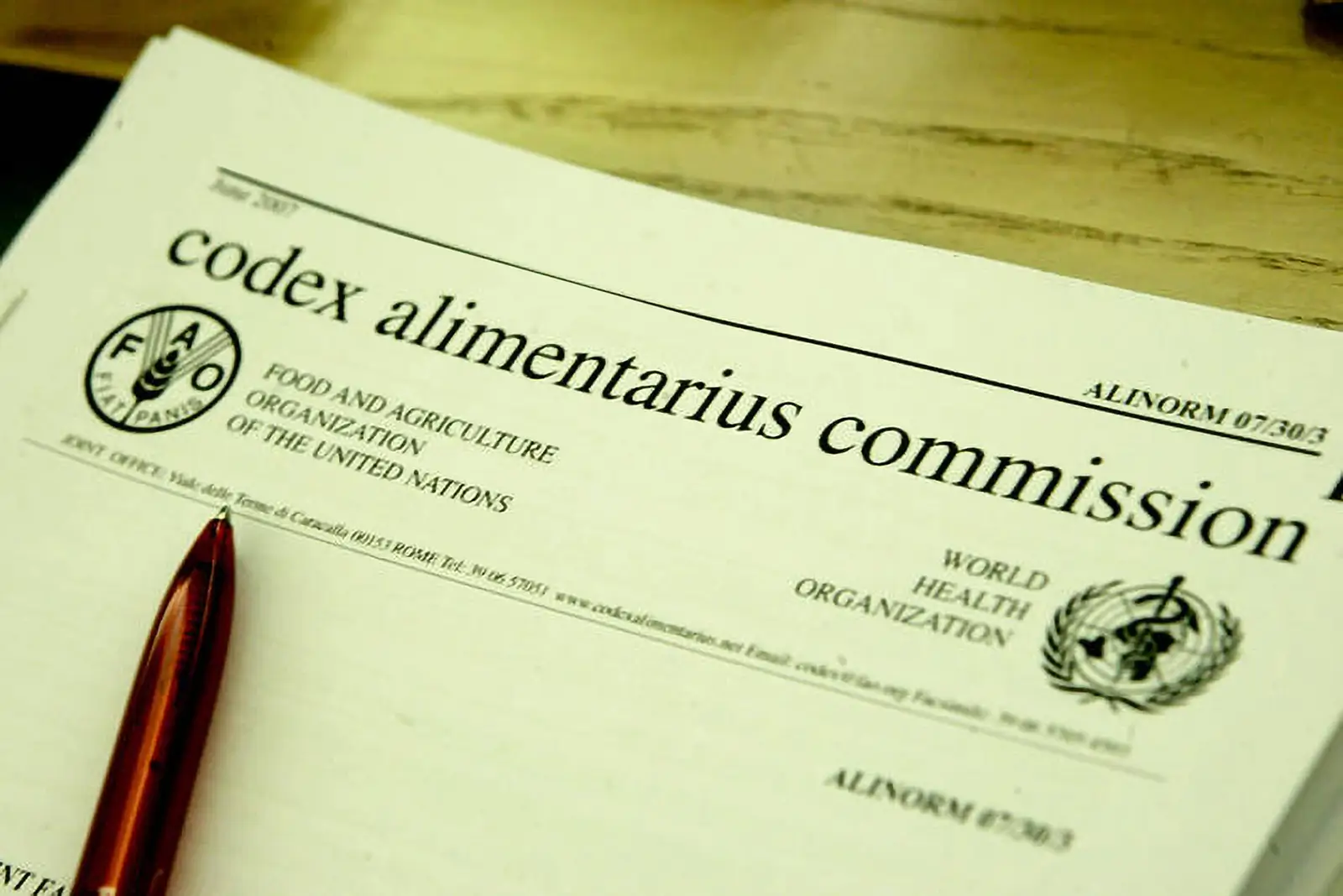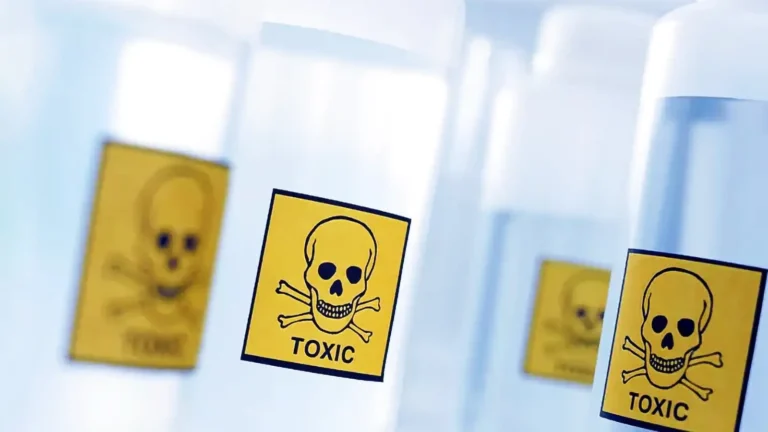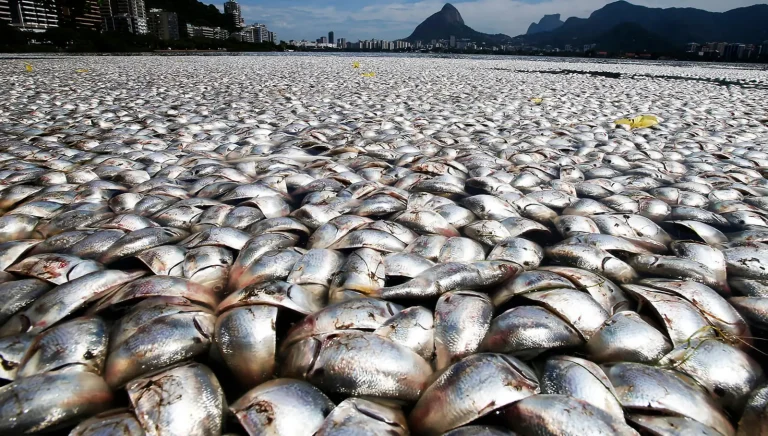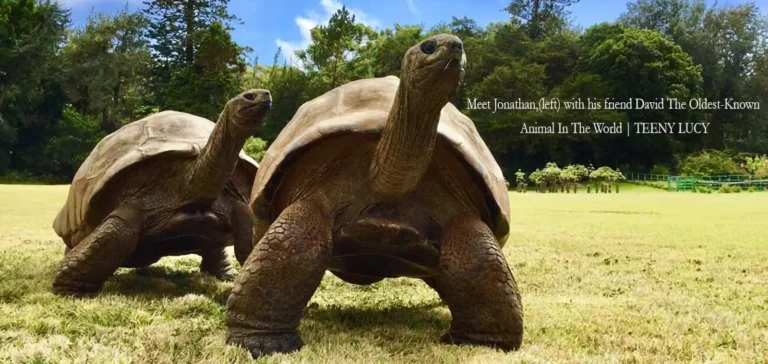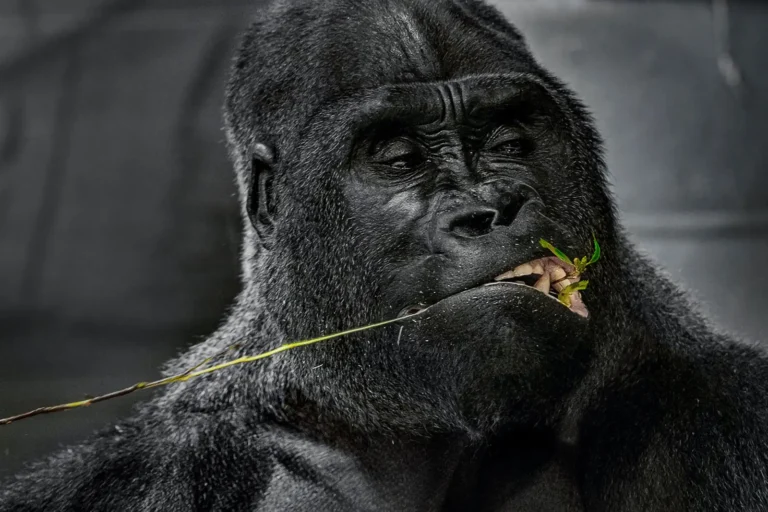Food Industry- Hunger by design
The necessity of feeding “9 billion people by 2050” has grown the be sick line expression for demanding still more globalization and more control.
Milos Pokimica
Written By: Milos Pokimica
Medically Reviewed by: Dr. Xiùying Wáng, M.D.
Updated September 2, 2023We might think that the food industry is just an industry, that there is nothing there, and that it is just regular business, but the situation is much more complicated than that. Food was used as a weapon at least four millennia ago in Babylon. From that time until now, nothing really changed. The food industry is controlled by the same group of people that control big pharmaceutical companies and that control all other international companies to a big extent. It is the same oligarchy over and over again.
Food is something very existential, and it is something very fundamental to human existence from the beginning of time. Even if we do not understand what is going on, people are going to be naturally suspicious if they suspect that their food is chemically enriched or genetically modified. They are going to ask questions that don’t directly consent to them such as: Why there is hunger in the world? The secrecy of corporations is just going to heighten the suspicion. Even if you do not understand what is going on you will see that small farmers around the world are in trouble and that every year they are being pushed out of business by some number.
And why are they in trouble? Well, there is too much food in the world, and it suppresses the prices. Not the prices in supermarkets that you pay, just the wholesale prices in which farmers are selling to big food companies for further distribution and that are highly susceptible to crop, seed, or products that will slightly reduce their costs even if in the long term effect is detrimental to the soil and environment. You can see this in India, and America, you see it in Canada and Argentina. It is a strategy to undermine small farmers’ livelihoods.
Six agrochemical corporations control around 85% of the entire world’s food markets and what they want to do is to gain control over the entire food chain, from the seeds to the table.
World hunger is not a technological problem. The world produces enough food. There are hungry people because the food is not distributed to them.
It is a problem of concentration of food in the hands of an agrochemical cartel that does not give access to poor people, and it is not even a money issue but the issue that is more in the line of eugenic protocols and population control.
The cause of the food deficit was not natural but was a result of the western financial policy. Considering the global population is now at 7.2 billion, in the lack of population control in their mind and some Pentagon projections, these 7.2 billion would become 14 billion by 2040, 28 billion by 2070, and 56 billion by the end of the 21st century. This is clearly in their mind an unsustainable growth given that we live on a finite planet, and that we now use almost 40% of the earth’s ice-free landmass to feed ourselves. There are no more landmasses to discover and exploit, we have destroyed the planet’s life maintenance systems and have polluted the soil and the sea.
“It is questionable,” Kissinger once gloated, “whether aid donor countries will be prepared to provide the sort of massive food aid called for by the import projections on a continuing long-term basis. The large-scale famine of a kind not experienced for several decades a kind the world thought had been permanently banished was foreseeable famine”.
This “return of famines” would not be possible without the participation of multinational corporations.
It is politics that execute the difference in times of famine. Food stocks are not significantly decreased as we might be thinking. Food is sold on the food market to those that can afford the higher prices. That is not the poor and rural populations of Africa, and this is done deliberately. Uneven distribution of food is a geopolitical decision, and that is the problem rather than the ratio of food to people. Also, wars and shifts in an industry that can create a vulnerable imbalance in a nation’s economy are important constituents. In developing nations, when the population quits farming to work in industry and technologies, food prices rise. A developing country with people struggling to raise its living standards would buy the cheapest food, and that is what Agro companies are glad to provide.
A political strategy used in collaboration with international food cartels is to undermine countries farming production creating dependence on imports. As small farms disappear, withholding food or raising prices can then be strategically used as a war strategy to coerce cooperation. The country’s resources are siphoned elsewhere by importing overpriced food that could be supplied from within. Control of an entire economy and the nation that relies on imports of food is easily accomplished. Not with war, but with food, or the lack of it. However, if it is a war that is wanted for a regime change, a hungry, rioting population certainly delivers.
Poverty and social collapse are the goals behind the last 50 years of the globalization of agriculture.
The food industry is not just the food industry. It is a political and geopolitical mechanism for power and control. The food industry is not your local candy manufacturer and coca cola. The food industry is the same industry in the same line of business as the military-industrial complex, banking, oil, and energy production, big chemical-medical cartels, and so on. Due to synthetic fertilizer invention, it is not as lethal as it use to be but it still is a pillar for control. In the past food industry had control over the existence of entire populations. And they have used it well in the past.
British neo-imperial plans for nation-states haven’t changed much. It is a policy that destroyed the most requirement for national survival: food self-sufficiency. In the U.S. aforementioned helped with the industrialization of agriculture and the invention of Agribusiness. With industrialized farming production of food had a lower and lower cost. In time small farmer disappeared and was replaced with food cartels. Now, the portion of the U.S. population that is self-sufficient and produces its own food is 2-3%, a shift from 1870 when it was between 70-80%. If something like the great depression strikes again, there would be no food for the vast amount of population that would depend on the government for survival. Food shortages seem remote and unreal in this land of plenty.
For “safety” reasons a heavily protested bill, S 510, The Food Safety Modernization Act was passed, and the intent is the same as policies in developing countries. To bury the small farmer. Additional concern over the bill is that the language allows for regulation over homegrown foods as well. The Food Safety Modernization Act looks like it is headed to become law. It is being hailed as a “breakthrough” achievement in food safety, and it would hand vast new powers and funding to the FDA so that it can clean up the food supply and protect all Americans from food-borne pathogens.
There’s just one problem with all this: It is all a big lie.
Moreover, even without the imposition of food supervision laws, the patenting of engineered seeds as a product has shifted the whole idea of food rights, utilizing what was once very simple into a complex problem. GMO seeds can be engineered to commit suicide after one harvest, leaving the farmer dependent on the corporation providing the seed. Farmers must also use the chemical herbicides and pesticides that these seeds are engineered to tolerate. Through the inevitability of cross-contamination, these genetically modified, patented organisms could invade the entire food supply. Pollen flies to non-GMO crops and pollinates them making half GMO hybrids. The effort by these corporations has gone so far ahead that they have set a precedent by successfully suing farmers whose crops have been cross-contaminated with patented genetic material.
The wind blows pollen on your normal corn, and you go to court. And that reveals the intent.
A number of African countries suffering from the worst food shortages have learned the lesson and will not allow GMO seeds into their countries, even in the form of food aid, without it being first milled to prevent it from being planted.
To survive into the future because of all of the overpopulation issue, the oligarchy is now “forced” to erect a global governing structure authorized to wield global governing instruments capable of maintaining “peace” among men, establishing harmony between man and nature, and of forging continuity between this and future generations. They must, in other words, consider not only what is good for us here and now but what is good for future generations and all life on earth and they must respond accordingly. Population control is the most urgent step needed of us here and now if we are to preserve our existence. Therefore, population control must and will be declared a Planetary Security Prerogative. Standard is a report by ten British writers, some of them from the U.K. Office of Science that represent government official policy, in Science magazine, “Food Security: The Challenge of Feeding 9 Billion People” (February 12, 2010). They conclude:
“Any optimism must be tempered by the enormous challenges of making food production sustainable while controlling greenhouse gas emission and conserving dwindling water supplies, as well as meeting the Millennium Development Goal of ending hunger…”
The necessity of feeding “9 billion people by 2050” has grown the be sick line expression for demanding still more globalization and more control. The crude estimation is that for today’s 6.8 billion people, around 4 billion tons of annual grain production is the level needed for adequate diets, in the form of personal cereals consumption, and for feeding the farm animals, and reserves. The underproduction of grains had a worsening additive effect.
This is what World Economic Forum has to say about it (https://www.weforum.org/agenda/2019/02/our-food-system-is-pushing-nature-to-the-brink-fourth-industrial-revolution/), and if you don’t know WEF and any other UN economic forum (WTO, World Bank, IMF) in large extent is not an unbiased place where best of the world economic advisors and scientist work but instead is just a public front for banking cartel oligarchy:
“Like our planet, the food system is currently in the red; it is extracting more than can be sustained and we are pushing nature to the brink. Without concerted action, the environmental impact of the food system could increase by 50-90% by 2050. We can no longer think on ‘either-or’ lines – there is simply no sustainable alternative to a food system that ensures the health of people and planet.”
“People and planet” and the entire environment agenda again have been used for pushing this propaganda. The environment is in terrible shape but this is not what these people really care about. Here is an infographics illustration from the WWF website.
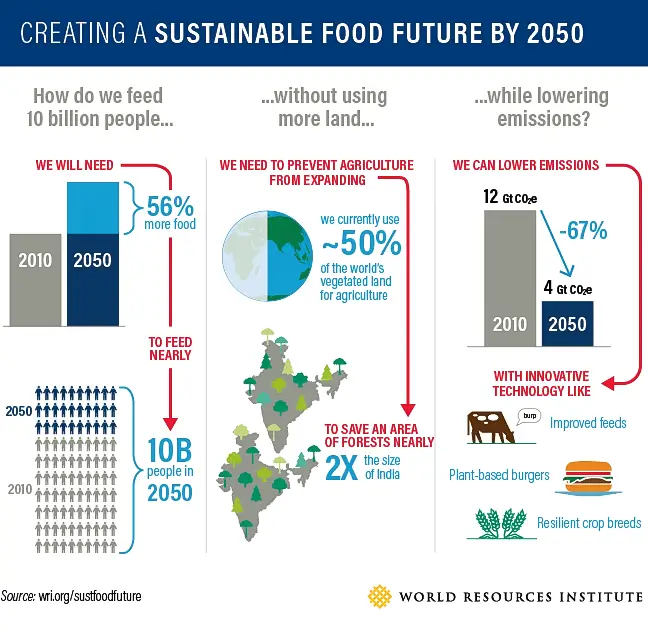
Because of the demand for oil, the world’s grain and oilseed crops are going into biofuels. In the U.S., which alone produces around 40% of world corn (maize) production, 40% of the entire corn crop went for fuel ethanol. The International Institute for Sustainable Development estimates that the CO2 and climate benefits from replacing petroleum fuels with biofuels like ethanol are zero.
Protecting the environment is a lie.
Biofuels do have direct, emissions that are typically 30–90% lower than those for gasoline or diesel fuels. However, since for some biofuels, indirect emissions that include land use change, water scarcity, loss of biodiversity, and nitrogen pollution through the excessive use of fertilizers can lead to greater total emissions than when using petroleum products. Around 60 nations have biofuel mandates, and the debate between ethanol and food has become a moral issue. In 2007, the global cost of corn doubled as a consequence of an outburst in ethanol production in the U.S. Because corn is the cheapest animal feed the price of dairy products, meat, eggs, and cereals rose as well. World grain reserves decreased to less than two months, the lowest level in over 30 years. Further unintended results from the rise in ethanol production incorporate the significant rise in land rents, the rise in natural gas and chemicals used for fertilizers, over-pumping of aquifers like the Ogallala, cutting even more forests to plant plants for fuel, return of harmful methods as edge tillage. Edge tillage is the practice of planting all the way to the edge of the field. This is bad because it removes protecting bordering plants and that results in chemical runoff from the field and soil erosion. It took 40 years to end edge tillage in the US.
Brazil relied massively on imported oil and therefore was under political pressure from oil-controlling forces. For self-sufficiency, they decided to plant crops for the production of biofuels. In their tropical climate, which can give high yields of sugar cane the government developed the most extensive fuel ethanol program in the world in the 1990s. The genetically modified fermenting bacteria to withstand high alcohol concentration and now almost are entirely fuel independent based on domestic sugar cane and soybeans production. As a consequence, Brazil is cutting nearly a million acres of tropical forest per year to produce biofuel from these crops. The result is about 50% more carbon emitted by using these biofuels than using petroleum fuels. The political imposition of the system of biofuels is undermining the capacity of the U.S. farm belt and agriculture everywhere. In the traditional U.S. corn belt now, instead of high-tech farmers, industry, and regional food production (milk, orchards, diversified crops, meat animals), the pattern is a monoculture, imported food, and ghost towns. Enforcing these models is an interlock of cartels of mega-companies in fertilizers, agrochemicals, processing, and distribution, integrated into policy with the WTO, World Bank, IMF, and private, London-centered financial networks. Even more corporate dominance and a smaller number of small farmers are dependent on international trade control by five companies.
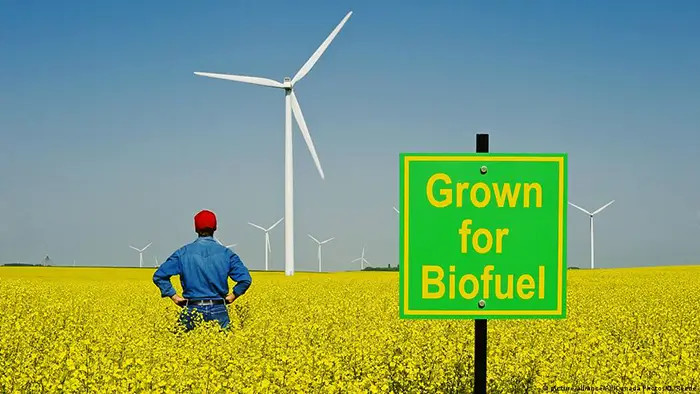
The entire world grain trade is controlled by Cargill, ADM, Bunge, Dreyfus, and very few others protected by the global political establishment and their institutions. For example, one central tenet of the WTO can speak for itself:
the decree that no nation has the right to seek food self-sufficiency, but instead, must operate on the definition of “food security” as “access to world markets.”
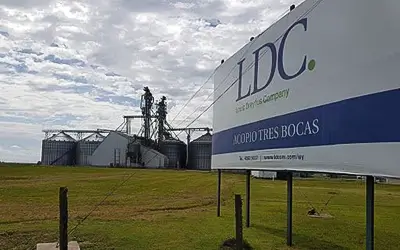



What this means is if you do not want economic suctions to be imposed by the US, EU, and others you must obey. This was declaration introduced in the GATT Uruguay Round (1984-94). It is a stealthy way to attack an individual and especially small developing countries and their national sovereignty. The establishing rules of the WTO justified its claim that member nations have no right to support their own farmers because that would be “depriving their citizenry” of the right to access superior world markets for potentially cheaper and better food. Controlled by a cartel of course. Behind this and other fallacies stand the same Anglo-imperial globalist banking and commodities cartels. The record of destruction is awful.
We can take Mexico as a good example. In the 1960s, Mexico was a net food exporter, with water-management projects planned, a program for nuclear power development, and a growing industrial base. Utilizing collaboration between the governments of Mexico and the new nation of India, always food short under British rule, India became grain self-sufficient as of 1974. All this was ruined, following the 1980s attack for an excuse as free trade, then the 1992 NAFTA (North American Free Trade Alliance), and finally the 1995 WTO. Mexico was required to remove corn and beans production and became import-dependent, all the while, serving as a cheap-labor outsourcing zone for cartel exports of frozen foods and fresh produce for the U.S. market. Now, hunger stalks Mexico. Millions fled looking for work and drug-running and death are displacing the farming that remains. This is the successful result of the British free-trade agriculture program.
The definition of genocide is the action to exterminate a group of people deliberately. That applies equally to those who devise and implement policies politically. British imperialists have forever favored the stealth method, wishing to let others get their hands dirty while they can play innocent pushing their agenda further. This has definitely been the case with the food policy, created for population control. Because of this policy, humankind has already reached the point where it is producing less than is required for its survival with the rising population in developing countries at the edge of hunger by design.
References:
Passages selected from a book: Pokimica, Milos. Go Vegan? Review of Science Part 2. Kindle ed., Amazon, 2018.
Related Posts
Do you have any questions about nutrition and health?
I would love to hear from you and answer them in my next post. I appreciate your input and opinion and I look forward to hearing from you soon. I also invite you to follow us on Facebook, Instagram, and Pinterest for more diet, nutrition, and health content. You can leave a comment there and connect with other health enthusiasts, share your tips and experiences, and get support and encouragement from our team and community.
I hope that this post was informative and enjoyable for you and that you are prepared to apply the insights you learned. If you found this post helpful, please share it with your friends and family who might also benefit from it. You never know who might need some guidance and support on their health journey.
– You Might Also Like –

Learn About Nutrition
Milos Pokimica is a doctor of natural medicine, clinical nutritionist, medical health and nutrition writer, and nutritional science advisor. Author of the book series Go Vegan? Review of Science, he also operates the natural health website GoVeganWay.com
Medical Disclaimer
GoVeganWay.com brings you reviews of the latest nutrition and health-related research. The information provided represents the personal opinion of the author and is not intended nor implied to be a substitute for professional medical advice, diagnosis, or treatment. The information provided is for informational purposes only and is not intended to serve as a substitute for the consultation, diagnosis, and/or medical treatment of a qualified physician or healthcare provider.NEVER DISREGARD PROFESSIONAL MEDICAL ADVICE OR DELAY SEEKING MEDICAL TREATMENT BECAUSE OF SOMETHING YOU HAVE READ ON OR ACCESSED THROUGH GoVeganWay.com
NEVER APPLY ANY LIFESTYLE CHANGES OR ANY CHANGES AT ALL AS A CONSEQUENCE OF SOMETHING YOU HAVE READ IN GoVeganWay.com BEFORE CONSULTING LICENCED MEDICAL PRACTITIONER.
In the event of a medical emergency, call a doctor or 911 immediately. GoVeganWay.com does not recommend or endorse any specific groups, organizations, tests, physicians, products, procedures, opinions, or other information that may be mentioned inside.
Editor Picks –
Milos Pokimica is a health and nutrition writer and nutritional science advisor. Author of the book series Go Vegan? Review of Science, he also operates the natural health website GoVeganWay.com
Latest Articles –
Top Health News — ScienceDaily
- Scientists find dark chocolate ingredient that slows agingon December 12, 2025
Scientists have uncovered a surprising link between dark chocolate and slower aging. A natural cocoa compound called theobromine was found in higher levels among people who appeared biologically younger than their real age.
- Nerve injuries can trigger hidden immune changes throughout the entire bodyon December 12, 2025
Researchers discovered that nerve injuries can alter the immune system throughout the body, and males and females react very differently. Male mice showed strong inflammatory responses, while females showed none, yet both transmitted pain-inducing signals through their blood. These findings reveal previously unknown pathways driving pain, especially in females. The work points toward new opportunities for personalized chronic pain therapies.
- NAD+ supplement shows early promise for long COVID fatigue and brain fogon December 12, 2025
Long COVID still affects people worldwide with stubborn symptoms like fatigue and cognitive issues. A clinical trial tested whether boosting NAD+ using nicotinamide riboside could help. Although overall group differences were limited, many participants showed encouraging improvements after taking NR for at least 10 weeks. The findings suggest NAD+ enhancement may offer symptom relief for some individuals.
- Stressed rats keep returning to cannabis and scientists know whyon December 11, 2025
Rats with naturally high stress levels were far more likely to self-administer cannabis when given access. Behavioral testing showed that baseline stress hormones were the strongest predictor of cannabis-seeking behavior. Lower cognitive flexibility and low endocannabinoid levels also contributed to increased use. The results hint at possible early indicators of vulnerability to drug misuse.
- Even moderate drinking carries a bigger cancer risk than you thinkon December 11, 2025
Researchers found that both how often and how much someone drinks significantly shape their cancer risk, even at moderate levels. Vulnerability varies across groups, with genetics, socioeconomic status, obesity, and lifestyle behaviors amplifying harm. The review also uncovered gender differences, beverage-specific risks, and biological pathways that intensify cancer development.
- Scientists uncover a hidden protein behind deadly mystery diseaseson December 11, 2025
Scientists discovered that the protein RPA plays a critical and previously unconfirmed role in stimulating telomerase to maintain long, healthy telomeres. When RPA malfunctions, telomeres can shorten dangerously, leading to serious diseases.
- Gene-edited CAR-T cells erase aggressive T-cell leukemiaon December 11, 2025
A cutting-edge therapy using base-edited immune cells is offering a major breakthrough for patients with one of the toughest forms of blood cancer, T-cell acute lymphoblastic leukaemia. By precisely rewriting tiny sections of DNA, scientists at UCL and Great Ormond Street Hospital created universal CAR T-cells capable of targeting the cancer without harming themselves—a long-standing challenge in T-cell–based therapies. Early trial results show deep, long-lasting remissions, including in […]
PubMed, #vegan-diet –
- Healthful and Unhealthful Plant-Based Diets and Their Association with Cardiometabolic Targets in Women Diagnosed with Breast Cancer: A Cross-Sectional Analysis of a Lifestyle Trialon December 11, 2025
CONCLUSIONS: Maintaining cardiometabolic risk factors within normal ranges is clinically relevant in BCS, and this may be more likely when a plant-based diet is consumed, especially if low in unhealthy plant foods.
- Dietary and Lifestyle Patterns and Their Associations with Cardiovascular and Inflammatory Biomarkers in Vegans, Vegetarians, Pescatarians, and Omnivores: A Cross-Sectional Studyon December 11, 2025
Background: Plant-based diets are associated with reduced cardiometabolic risk, yet the influence of lifestyle behaviors on these benefits remains insufficiently understood. Objective: To assess the combined impact of dietary patterns and lifestyle behaviors on body composition, lipid profiles, and inflammatory biomarkers in healthy young adults. Methods: In this cross-sectional study, 155 participants aged 18-39 years were categorized into four dietary groups: vegans (n = 48), vegetarians (n […]
- Functional and Nutritional Properties of Lion’s Mane Mushrooms in Oat-Based Desserts for Dysphagia and Healthy Ageingon December 11, 2025
Hericium erinaceus (Lion’s Mane mushroom) is a medicinal species recognised for its neuroprotective and antioxidant properties. This study investigated its potential as a functional ingredient in oat milk-based desserts formulated for individuals with dysphagia. Freeze-dried Lion’s Mane powder (LMP), containing high-quality protein (~16%, amino acid score 88%), dietary fibre (~31%), and phenolic compounds (72.15 mg GAE/g), was incorporated at varying levels using gelatin or iota-carrageenan […]
- “A football team with no midfield”: A qualitative analysis of anti-vegan stigma in Italyon December 7, 2025
A growing body of research has demonstrated the prevalence of unfavourable attitudes towards individuals who adhere to a vegan diet and has provided empirical evidence to support the existence of an anti-vegan ideology. The present study aims to contribute to extant knowledge by examining the social perception of veganism and vegans in Italy. Italy is a nation characterised by a traditional culture of food that serves as a significant catalyst for collective identification and national pride….
- Plant-based dietary index on the Mediterranean and a vegan diet: a secondary analysis of a randomized, cross-over trialon December 5, 2025
CONCLUSION: These findings suggest that, replacing animal products even with the “unhealthful” plant-based foods on a vegan diet was associated with weight loss.
Random Posts –
Featured Posts –

Latest from PubMed, #plant-based diet –
- Bioactive Nutritional Components Within the Planetary Health Diet for Preventing Sarcopenic Obesity and Diabetic Sarcopenia: A Systematic Reviewby Lia Elvina on December 11, 2025
CONCLUSIONS: PHD-aligned foods combining plant proteins, polyphenols, and fermented products strengthen nutrient sensing, mitochondrial efficiency, and cellular resilience, representing a sustainable nutritional framework for preventing and managing SO and DS.
- Ultra-Processed Foods Consumption, Mediterranean Diet Adherence and Sociodemographic Correlates in an Italian Adult Population: The UFO Surveyby Emilia Ruggiero on December 11, 2025
Background: Although national surveys report increasing ultra-processed foods (UPFs) consumption, updated estimates for Italy are lacking. Given the central role of the Mediterranean Diet (MD), understanding how UPFs contribute to the contemporary Italian diet is essential. This study quantified UPF intake in a convenience sample of Italian adults and examined its main sociodemographic correlates, including MD adherence. Methods: A web-based cross-sectional survey was conducted among Italian…
- High-Salt Diets, Intestinal Barrier, and Hypertension: A Mechanistic Review and the Promise of Dietary Therapyby Wenhao Si on December 11, 2025
Hypertension is a major public health problem worldwide, and high-salt diets are one of the main causes of hypertension. The intestinal mucosal immune system is the largest immune organ in vertebrates. Hypertension was associated with increased intestinal permeability and an inflammatory state. The bacterial communities attached to the intestinal mucosa played a significant role in the development and maturation of the autoimmune system, as well as inflammation and immunity to disease. In […]
- Health-Promoting Potential of the Mediterranean Diet and Challenges for Its Application in Aging Populationsby Marta Cianciabella on December 11, 2025
The Mediterranean Diet (MD) is a lifestyle that involves not only dietary habits, well known for their effectiveness in preventing health risks by supplying well-balanced foods rich in bioactive compounds, but also daily habits that improve the quality of life. Older adults represent a segment of the population that can particularly benefit from this dietary pattern. However, the specific characteristics and needs of older individuals require a critical analysis of aspects that may limit…
- Association of Mediterranean Diet Scores with Psychological Distress in Pregnancy: The Japan Environment and Children’s Studyby Yuri Takahashi on December 11, 2025
Background/Objectives: Perinatal mental disorders are important health issues that affect both mothers and their children. The Mediterranean diet (MD) is one of the most well-recognized healthy dietary patterns worldwide. Recent evidence suggests that MD may prevent or reduce the risk of perinatal mental disorders. This study investigated the association between MD adherence during pregnancy and psychological distress in a large cohort of Japanese births. Methods: Data were obtained from […]
- Protective Role of Ginsenoside F1-Enriched Extract (SGB121) in Metabolic Dysfunction-Associated Fatty Liver Disease (MAFLD)by Bo Yoon Chang on December 11, 2025
Introduction/Objectives: Ginsenoside F1, a pharmacologically active saponin derived from Panax ginseng, exhibits diverse bioactivities, but its use is limited because it is difficult to purify and has high production costs. To overcome these challenges, a ginsenoside F1-enriched extract named SGB121 was developed. This study aimed to evaluate the therapeutic efficacy of SGB121 in a high-fat, high-carbohydrate (HFHC) diet-induced metabolic dysfunction-associated fatty liver disease (MAFLD) […]
